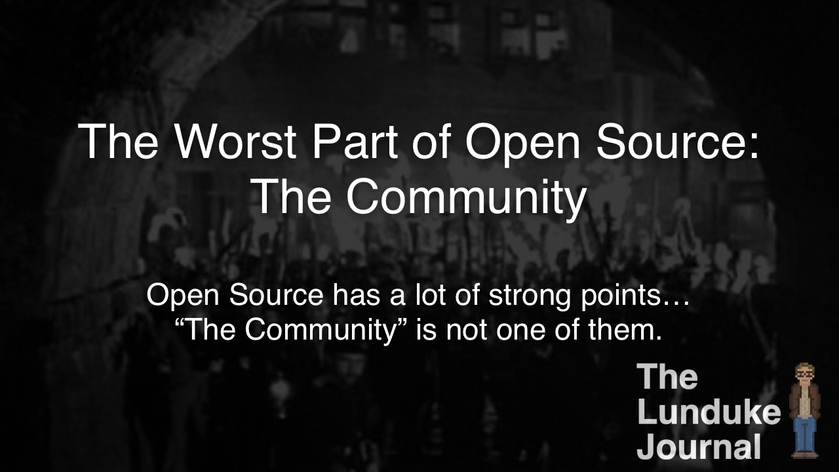"Oh-muh-gosh! Community is so important to Open Source!"
How often do we hear that? How often are we inundated with declarations of how absolutely amazing the "Linux Community" or the "Open Source Community" are?
Constantly.
There are entire conferences dedicated to Open Source "Communities" -- and nearly every company or foundation which is even remotely "Open Source-y" has an official "Community Manager" position. Sometimes several of them.
The Heck With That
Well, I'm here to say what most of us are thinking (but are afraid to say out loud):
The "Community" is the absolute worst part of Open Source Software.
Search your feelings. You know it to be true.
Over the last few years we have seen an onslaught of attacks -- on the software we use and love (and the people that build and use that software) -- perpetrated by that "Community" that is deemed so important and amazing.
Here are 5 quick examples to give you an idea of what the "Open Source Community" does.
- The NixOS "Community" committed a "purge" (their word) of people they don't politically agree with (who they attacked and libelously labeled as "Nazis") -- even forcing their founder out of the project.
- The openSUSE "Community" engaged in mass bannings of contributors and users with the wrong political leanings (calling them "Rotten Flesh" which must be "cut out").
- The Python "Community" suspended one of their most prominent members for "liking an old SNL sketch".
- The GNOME "Community" regularly bans anyone (even prominent contributors) who simply mention the existence of "The Lunduke Journal" -- and their leadership convenes secret meetings to overturn the results of votes by their members.
- The "Open Source Community" attacked the creator of the Ladybird Web Browser -- who they libelously called a "supporter of human slavery" and a "transphobe".
The examples go on, and on, and on. We could spend all day listing recent incidents where the "Open Source Community" has actively brought about significant harm and destruction -- both to the software they claim to support... and to the people who build and use it.
In fact, I would say there is a very strong case to be made that the "Community" is the single biggest problem with Open Source Software.
Not All Communities Are Good
A "Community" of people can be a fantastic, productive, supportive force. But, if that was ever the case with the "Open Source Community" -- and, I believe, at one point (long ago) it was -- it certainly is not anymore.
The word "Community" gets thrown around -- rather constantly -- as if it's some magical, always wonderful thing. When the truth is often the exact opposite.
Case in point: An enraged mob carrying torches and pitchforks. That's a community.

A group of zombies, shuffling together towards their next meal (your brains). That, also, is a community.

We could list an almost endless number of examples of "communities" which are destructive and, in many cases, downright evil. But I think you get the point.
The hard reality is that the "Open Source Community" has become something akin to the torch-wielding mob (with a dash of zombie thrown in for good measure).
Destructive. Angry. Terrorizing.
And, importantly, striking fear in the hearts of any who dare oppose the mob.
An anecdotal example:
Recently, I was having a discussion, via E-Mail, with the founder of a prominent Open Source project. There had been a round of mob-like attacks on some of the members of that project (because that's what happens in Open Source projects with a "Community"), and I was working on an article covering those events.
All very ordinary. That sort of thing happens weekly.
Then the founder of that project requested -- nay... pleaded -- that I hold off on publishing the article. And, if I did publish the article, to not include the founders name or indicate that we had spoken at all.
Because, and I quote, "I worry that it will make things *worse* for me."
The founder feared what the mob (aka the "Community" of the Open Source project which that person had created) would do if they found out we had simply spoken.
If you speak out against the mob (the "Community")... the mob attacks you. Everyone knows it. And everyone fears it.
The Mob Will Continue if We Let It
That project founder is not alone.
It is exceedingly rare that more than a few days go by without hearing about similar situations -- people (contributors, founders, and users) bullied and terrorized into silence by a mob hiding behind the moniker of "Open Source Community".
A mob which has been -- often -- granted extreme levels of power over projects, foundations, and corporations. Power which they use to drive away founders, contributors, and users and -- along the way -- effectively hold the remaining contributors hostage through an environment of terror.
This "Community" is, observably, causing more damage to Open Source than any other single thing I can think of.
Make no mistake... Open Source Software is, in my opinion, a wonderful, positive thing. Software being "Open Source" allows it to be used and maintained long past the time the original developers may have moved on or dropped support. It facilitates increased security testing, historical preservation, and so many other benefits.
In short, Open Source -- both the concept and practical implementation -- is worth saving.
The question is: How can this "Community" be stopped? How can we, effectively, disarm this mob... this "Community"?
I suggest the two following actions.
- Speak out when the "Community" bullies you (or others). Directly. Publicly. If you fear retribution (as so many do), reach out to the press to discuss how to publish your story while retaining your anonymity.
- For project founders: Retain (or re-obtain) absolute control over your project. Be a dictator. If the "Open Source Community" is allowed any level of unchecked control over your creation (including something as seemingly simple as "moderation of a forum"), the "Community" will use it to harm you and others. One person must always have dictatorial control -- the right to over-ride anything -- within a software project.
This may sound harsh -- and rather extreme -- to many of you. Unfortunately, the harsh reality of the "Open Source Community", necessitates these sorts of measures in order to limit the effectiveness of the mob.
The more people that speak out about the bullying and terror tactics of the mob... the safer it gets for others to speak out as well. Likewise removing power from the mob is always a smart move when dealing with... well... a mob.
Many will criticize the things I am saying here. They will say that I am "anti-Community" or "anti-Democracy" or the like. It is a near certainty that members of the "Open Source Community" will hurl a wide variety of insults my way. That is expected.
Nothing enrages the mob (aka the "Open Source Community") more than speaking the truth publicly.















